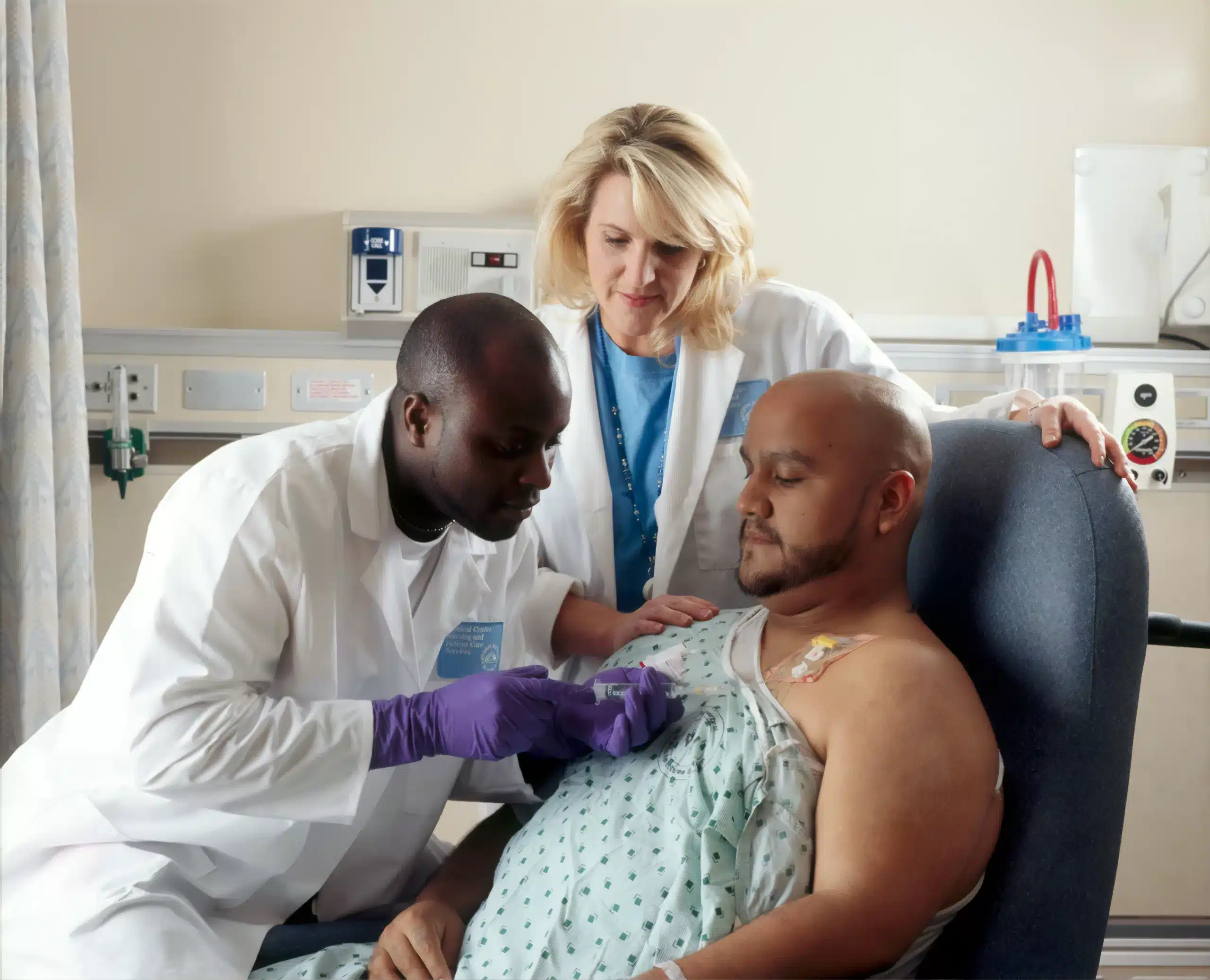What is Chemotherapy?
Chemotherapy is a treatment for cancer which is used to fight and kill cancer cells within the body. There are different types of chemotherapy and according to the NHS, they all work in a similar way. Each type is designed to prevent cancer cells from reproducing which then prevents the cells from spreading around the body.
How to maintain a healthy lifestyle when receiving chemotherapy
Eating a healthy diet can be a useful compliment to your cancer treatment, according to chemocare. Ensuring you stay hydrated and maintain muscle tissue with enough fluids, calories and nutrients can help your treatment. This can also enhance your immune system and help limit debilitating side effects, such as fatigue.
During chemotherapy, doctors monitor the level of a particular white blood cell called neutrophil. If the level becomes low, this is known as neutropenia, says Blood Cancer UK. If you are diagnosed with neutropenia, you are at a higher risk of infection. According to breastcancer.org, you should do the following to reduce the risk of infection:
- Wash your hands for a full 20 seconds
- Use separate chopping boards and knives when handling raw meat
- Ensure all food is cooked at the correct temperature
- Put all perishable foods in the fridge within an hour, and when defrosting foods, place the food in the fridge and not on the counter
They also advise that you should avoid the following foods:
- Raw or undercooked meat, poultry, seafood, and eggs
- Unpasteurized or raw milk
- Unwashed fresh produce
- Soft and raw milk/unpasteurized cheeses
- Cold or undercooked hot dogs and deli meats
- Raw sprouts (alfalfa and bean)
Grapefruit should also be avoided when undergoing chemotherapy and can affect the metabolism of the drugs. This could affect the treatment of the cancer say Food For Breast Cancer. Taking dietary supplements is also not advised, according to Facing Hereditary Cancer Empowered; as taking the before or during chemotherapy may affect its ability to kill cancer cells.
Cancer Research UK says that two common side effects of chemotherapy are diarrhoea and constipation. To help cope with diarrhoea you should:
- Eat less fibre (such as raw fruits & cereals)
- Drink plenty of liquid
If you are suffering from constipation as a result of chemotherapy you should:
- Eat more fibre
- Drink prune juice or hot drinks
- Maintain a well balanced diet
- Increase physical activity
How chemotherapy may affect your social life
Chemotherapy may take its toll and mean that you are no longer able to do everything you could before the treatment started. However, this doesn’t mean you need to stop your social life completely. Cancer Research UK offers the following tips on how to make social events easier:
- Get plenty of rest
- Take anti-sickness tablets before you go out
- Drink smaller quantities of alcohol. This won’t affect most types of chemotherapy, but it is best to check with your doctor first
- Eat freshly cooked meals
- Avoid supplements and foods that contain pro-biotics such as yogurts
Other things that Cancer Research UK suggests you may want to be mindful of:
Alcohol – Whether you drink alcohol while having chemotherapy may depend on the drugs you are having. With some chemotherapy drugs its vital you do not drink alcohol as it may make you feel unwell. Your doctors and nurses will give you specific advice as to whether drinking alcohol is safe with your treatment.
Infections and vaccines – It is important that you avoid friends and family members who may have chicken pox and you should inform your doctor if you believe you have come into contact with anyone who has chicken pox. While you are having chemotherapy you should also not have any live vaccines, although it is fine for you to be in contact with people who have.
Holidays – Some people who go through chemotherapy like to book holidays as something to look forward to during their treatment. It might be advised that you may enjoy your trip more if this is booked a few weeks after your treatment has ended. The time between treatment should enable you to adjust to normal life again.
Things not to do while on chemotherapy
Although there are many things you can still do whilst you are having chemotherapy, there are things that you may want to or be advised to avoid. Healthline have put a list together of 9 things to avoid during chemotherapy treatment:
- Contact with your bodily fluids after treatment: It can take between 48 – 72 hours for the drugs to pass through your system after treatment, so avoiding contact within any bodily fluids, such as urine, is important as they can be harmful to you and others. It is advised by Healthline than you wash your hand thoroughly, flush the toilet twice, wash all fabrics that may have been in contact with bodily fluids and clean up thoroughly if you are sick.
- Overextending yourself: It is usual to become fatigued whilst having chemotherapy, therefore it is important you don’t overexert yourself and become exhausted, it is advised you get plenty of rest and don’t be afraid of asking for help.
- Infections: During chemotherapy your immune system is weakened, so you are at a greater risk of contracting infections. To try and avoid them, you should wash your hands thoroughly, carry hand sanitiser, avoid others who are unwell, avoid crowded places and ensure food is stored correctly.
- Large meals: A side effect of chemotherapy for some can be a loss of appetite, however it is important that you eat well in order to avoid further fatigue. If you have a small appetite you may want to just eat a single large meal a day rather than several meals.
- Raw & undercooked foods: Your immune system is weakened during chemotherapy, so it is important that you do not eat raw or undercooked foods especially meat, fish, and egg.
- Hard, acidic, and spicy foods: Another side effect some people have during chemotherapy is increased sensitivity to your mouth and throat. So, during treatment it may be worth avoiding foods that are going to irritate you, these might include crisps, citrus fruits and toast as some examples.
- Frequent and heavy alcohol consumption: Small amounts of alcohol shouldn’t affect your treatment although it is important to seek advice about this from your doctor.
- Smoking: This can lower immunity and increase your risk for other health conditions.
- Ultraviolet (UV) light: Chemotherapy can make our skin more sensitive to UV light, therefore avoiding things such as sunbeds during your treatment is advised to avoid burning and other reactions from the skin.
Have you suffered chemotherapy negligence?
As medical negligence experts, we have experience in handling cases in relation to chemotherapy. An example of this is when a 77 year-old man received unnecessary chemotherapy. This happened when the hospital failed to diagnose his prostate cancer and as a result he was compensated £12,500.

